Are Olives Healthy for You?
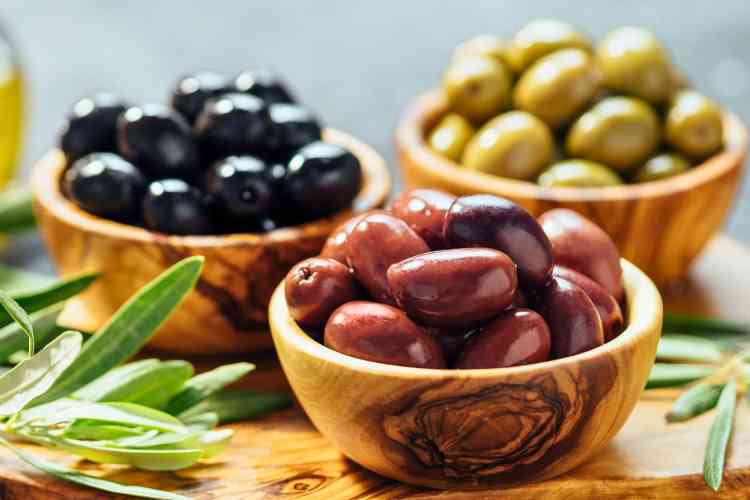
If you’ve ever found yourself snacking on olives straight from the jar, you might have asked yourself, “Are olives healthy?”
What’s more, with the soaring popularity of the Mediterranean diet — it was ranked as the healthiest diet in 2025, after holding the title for many years — boosting the profile of olives and olive oil, it might start feeling especially pertinent to know whether olives are actually healthy.
If you’re a fan, you’ll be glad to know that the answer is generally yes; olives are healthy when eaten in moderation. They provide heart-healthy monounsaturated fats, though portion size matters since many olives are high in sodium due to curing and brining.
So, are olives healthy? Absolutely, but why are they healthy? Are green olives healthier than black olives? And what health benefits can you gain from eating these Mediterranean fruits?
To answer all these questions and more, read on to find out why you should reach for that jar of olives next time you need a snack.
Jump to Section
- Are Olives Healthy for You?
- How Healthy Are Olives for You?
- What Are the Health Benefits of Olives?
- How To Incorporate Olives Into Your Diet
Are Olives Healthy for You?
Yes, olives are generally considered healthy for you. There is a reason that olives play such an important role in the heart-healthy Mediterranean diet. In addition to whole grains, fresh produce, legumes, fish and lean meats, olive oil is a critical component of the Mediterranean diet.
So, we know that olives are good for you, whether you’re cooking with olive oil or snacking on pitted olives. But why are olives healthy?
Firstly, olives contain vitamin E and a range of antioxidant compounds. As the Cleveland Clinic explains, vitamin E helps protect cells from damage caused by free radicals, which are linked to inflammation and chronic disease. Olives also provide small amounts of minerals such as iron and copper, which contribute to normal red blood cell formation and energy metabolism.
In addition, olives contain fiber, which supports digestion, though they are not a high-fiber food compared with fruits, vegetables and whole grains. Another reason people ask, are olives healthy, is their connection to heart health.
Olives are rich in monounsaturated fats, particularly oleic acid. Diets that emphasize these fats in place of saturated fats have been associated with healthier cholesterol levels and a lower risk of cardiovascular disease.
Olives also contain plant compounds with antioxidant and anti-inflammatory properties, which may support overall health when included as part of a balanced diet. While olives do provide small amounts of calcium, they should be viewed as a complementary food rather than a primary source for bone health.
Watch Sodium Intake
But be careful with overeating olives, as sodium is the biggest nutritional drawback of this otherwise healthy food. Olives are healthy, but since they’re usually kept in a briny liquid, they can be high in salt.
If you have high blood pressure or you’re trying to prevent it, keep portions modest to avoid too much sodium. Choosing lower-sodium options, draining and rinsing pitted olives, or pairing them with low-sodium foods can also help you keep your overall intake in check.
Olive Oil
So, to recap: are olives healthy? You bet. But what if you don't like the taste of them? Even if whole olives are not to your taste, you can still get many benefits from incorporating the healthiest olive oil into your cooking, especially extra-virgin olive oil, which retains more of olives’ natural compounds.
It’s also worth keeping in mind that more refined or lower-grade olive oils typically contain fewer antioxidants due to processing. And while olive oil is considered a healthy fat, it’s still calorie-dense, so using it in moderation is key.

Are Green Olives Healthy for You?
The difference between green and black olives isn’t as stark as you might think. They’re the same fruit — did you know the olive is a fruit, by the way, and sometimes even considered among the healthiest fruits?
Green olives are picked before they’re ripe, while black olives are ripe when they’re picked. Ask, “Are olives healthy?” and the answer will be yes, no matter what variety you’re talking about. Green and black olives are fairly similar nutritionally, but there are slight differences you may want to note.
Calories, Fat and Sodium
Are green olives healthy for you? Absolutely, but green olives tend to contain more sodium, calories and fat than black olives. These differences aren’t huge and green olives are healthy either way, but you may want to note that if fat or sodium is something you’re watching.
Because of this, it’s a good idea to look for lower-sodium options, especially when choosing green olives. Checking ingredient lists for simpler curing methods and fewer additives can also help you make a more balanced choice.
Vitamin E
Are green olives healthy when it comes to micronutrients? They can be. Green olives tend to contain a bit more vitamin E than black olives, although the difference isn’t dramatic. Vitamin E acts as an antioxidant and supports skin health and normal immune function, making green olives a helpful addition if your intake of this nutrient is on the lower side.
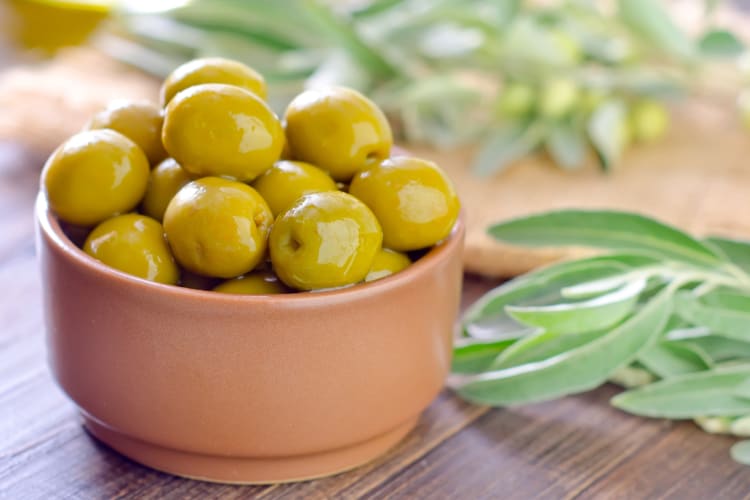
Are Black Olives Healthy for You?
All olives can be part of a healthy diet, but you may wonder, are black olives healthy compared with other varieties? The answer is yes. Black olives are nutritionally similar to green olives, with a few modest differences.
If you’re anemic or working to increase your iron intake, black olives can contribute small amounts of iron. They do tend to contain slightly more iron than green olives, though they shouldn’t be relied on as a primary iron source.
Compared with green olives, black olives are often lower in sodium because they’re typically cured for longer, and any differences in fat and calorie content are usually minor. As with all olives, it’s still wise to look for low-sodium, minimally processed brands to get the best nutritional value.
So, are olives healthy and are black olives healthy specifically? When eaten in moderation and as part of a balanced diet, black olives can be a flavorful way to add healthy fats to your meals.

Are Kalamata Olives Healthy for You?
This is a bit of a trick question, because Kalamata olives are actually a sub-variety of black olives. What makes Kalamata olives special isn’t their nutritional profile or even flavor, but where they’re grown: true Kalamata olives have to be grown in Greece’s Messenia region.
Outside of that geographic distinction, Kalamata olives are better known for their unique and intense briny flavor. This sets them apart from other black olive varieties.
Nutritionally, however, this Greek food is pretty similar to other olives. They’re relatively calorie-light per olive, they provide mostly unsaturated fat, they contain antioxidant compounds and they can be high in sodium because of the brine.
They can also contribute small amounts of minerals like iron. Put it together and the headline holds: yes, Kalamata olives are healthy, especially as part of an overall Mediterranean-style eating pattern.
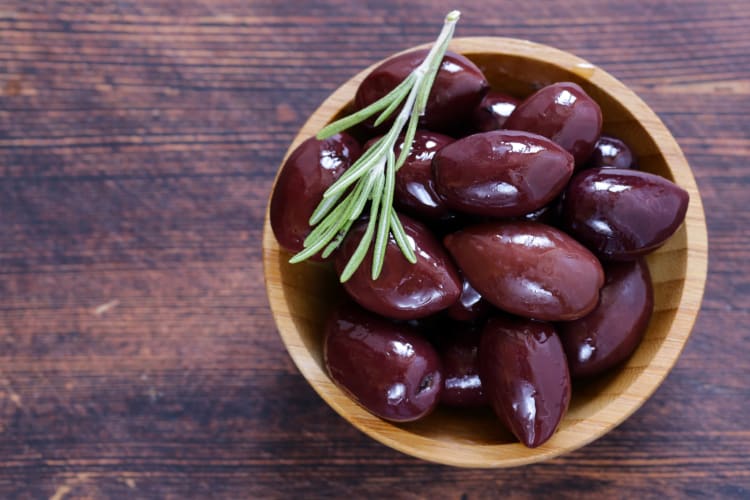
Are Olives Healthy for Everyone?
Now that we've answered the question "Are olives good for you?", it's important to consider whether olives are healthy for everyone. Of course, those with an allergy to olives, though rare, should avoid adding them to their diet.
Additionally, those who need to watch sodium intake very closely, such as those with high blood pressure or kidney issues, may need to limit olives or enjoy them only in small portions.
No matter your health status, portion size matters. Most olives are fairly high in sodium, and the American Heart Association recommends no more than 2,300 milligrams of sodium per day, with an ideal limit of 1,500 milligrams for most adults.
If sodium is a concern, using olive oil can be a practical alternative. Olive oil provides many of the same healthy fats and plant compounds found in olives without the added salt, making it an easier fit for lower-sodium eating patterns.
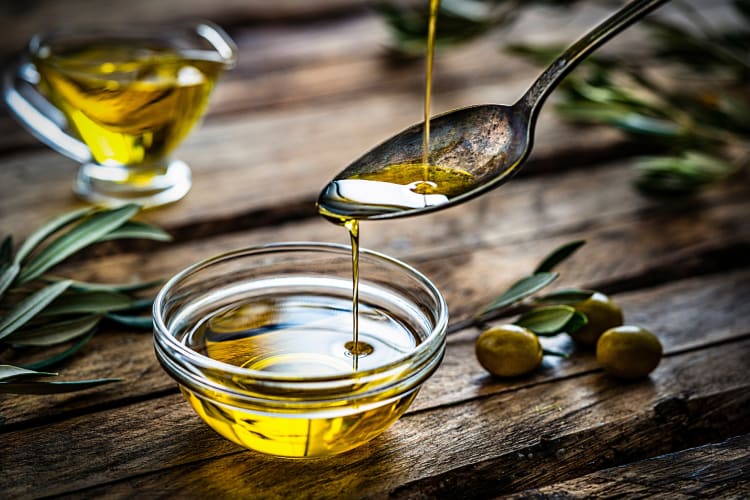
How Healthy Are Olives for You?
We’ve answered the question, “Are olives healthy?” in detail, but how do the numbers stack up? Here is the nutritional profile of black olives, so you can see how healthy black olives are for yourself.
Black Olives Nutrition Info (per 50-gram serving):
- Calories: 52.5
- Total Fat: 4.77 grams (6% DV)
- Saturated Fat: 0.63 grams (3% DV)
- Carbohydrate: 3 grams (1% DV)
- Sodium: 440 milligrams (19% DV)
- Fiber: 1.5 grams (5.5% DV)
- Protein: 0.44 grams
- Iron: 1.655 milligrams
- Calcium: 45 milligrams
- Vitamin E: 0.825 milligrams
While this overview makes it easy to see why black olives are healthy, it’s also important to note that the sodium content is a little high.
Since a diet high in sodium can lead to high blood pressure and heart disease, you might want to focus on including low-sodium varieties of black olives in your diet to avoid consuming excess sodium.
Canned Green Olives Nutrition Info (per 50-gram serving):
- Calories: 73
- Total Fat: 7.7 grams (10% DV)
- Saturated Fat: 1 gram (5% DV)
- Carbohydrate: 1.9 grams (1% DV)
- Sodium: 778 milligrams (32% DV)
- Fiber: 1.7 grams (6% DV)
- Protein: 0.52 grams
- Iron: 0.25 milligrams
- Calcium: 26 milligrams
- Vitamin E: 1.905 milligrams
Looking at the numbers, it’s clear that green olives can be significantly higher in sodium than black olives, with a somewhat higher fat content as well. That difference has more to do with curing and brining methods than color alone, but it’s still worth paying attention to.
So, are olives healthy no matter what color you choose? In general, yes. But if you’re watching your sodium or fat intake and wondering which olives are the healthiest for you, black olives or smaller portions of green olives may be the easier fit.
You may also be curious about olive oil, since it’s such a convenient way to get the benefits of olives in your diet, especially if you don’t love the flavor of whole olives. Nutritionally, 1 tablespoon (15 grams) of olive oil provides about 118 calories, roughly 13.5 grams of fat, most of it unsaturated and close to 2 milligrams of vitamin E.
While olive oil doesn’t offer fiber or minerals in the same way whole olives do, it delivers many of the same healthy fats and antioxidant compounds, with the added benefit of containing no sodium.

What Are the Health Benefits of Olives?
We’ve already touched on why people ask, “Are olives healthy?”, but if you want to dig a little deeper, these are the main health benefits olives can offer. When eaten in moderation, olives may support heart health, help with appetite control and contribute beneficial plant compounds to your diet.
1. Fighting Inflammation
Olives contain antioxidant compounds that help counter oxidative stress in the body. Chronic inflammation plays a role in many conditions, including cardiovascular disease, so this is one reason olives are healthy as part of an overall balanced eating pattern.
As Harvard Health notes, olive oil in particular has been studied for its anti-inflammatory effects, meaning you can still get this benefit even if you’re not a fan of whole olives.
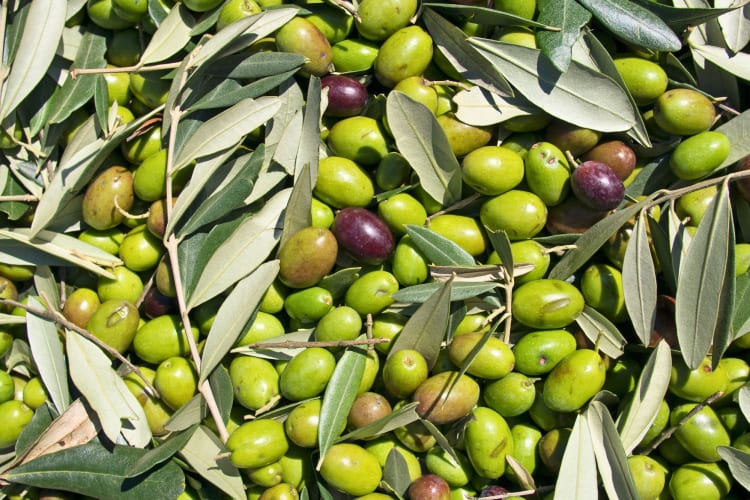
2. A Heart-Healthy Snack
The Mediterranean diet is consistently ranked among the healthiest eating patterns, and olive oil is a central component. Large studies, including research published in the New England Journal of Medicine, have shown that following a Mediterranean-style diet is associated with a significantly lower risk of cardiovascular disease.
One reason olives are healthy for the heart is their fat profile. Olives are rich in monounsaturated fats, which, when used in place of saturated fats, are linked with healthier cholesterol levels. Their antioxidant compounds may also play a supportive role in heart health.
Olives can be healthy snacks and part of a heart-conscious diet, though overall eating habits matter more than any single food. So, if you've been wondering, "Are olives heart-healthy?", the answer is yes!
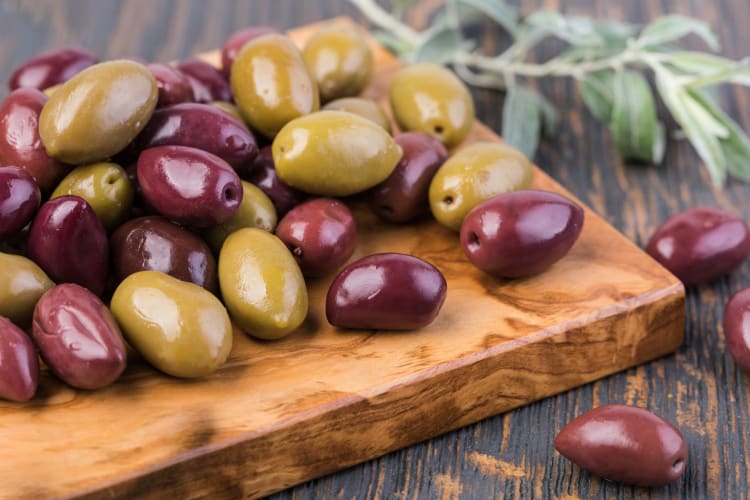
3. Adds Flavor That Can Support Heart-Healthy Eating
One underrated reason olives are healthy is that they add a big hit of savory, briny flavor. That can make meals built around vegetables, beans, fish, whole grains, and other Mediterranean-style staples feel more satisfying without relying as much on highly processed sauces or extra salt at the table.
Olives still contribute sodium, so portions matter, but using a small amount for flavor can be a practical way to make healthier meals more enjoyable and easier to stick with.

4. Vision and Skin Health
Vitamin E supports eye health by helping protect cells from oxidative damage, as explained by Johns Hopkins Medicine. Olives provide vitamin E, though amounts vary by type and processing.
While olives alone won’t prevent vision changes, they can contribute to overall antioxidant intake that supports eye, skin and hair health.
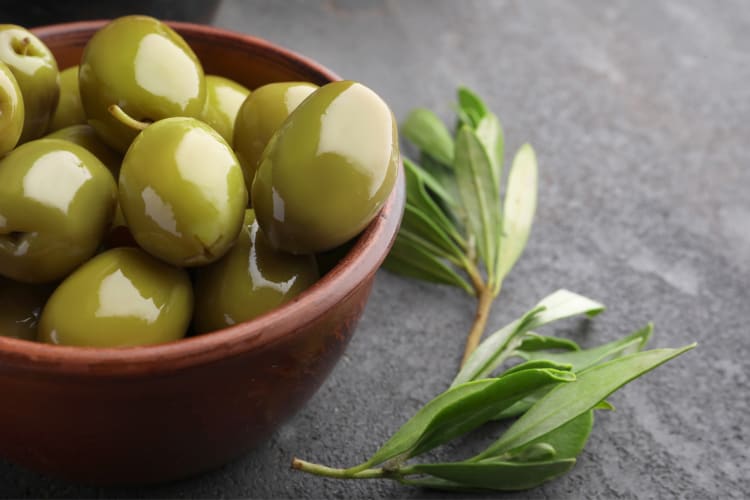
5. Appetite Regulation
Because olives contain unsaturated fats and some fiber, eating a small portion may help promote satiety. This can support appetite control between meals, which is one reason olives are healthy when included as part of a balanced snack or meal.
Just remember, portion size matters, especially due to sodium and calorie content.
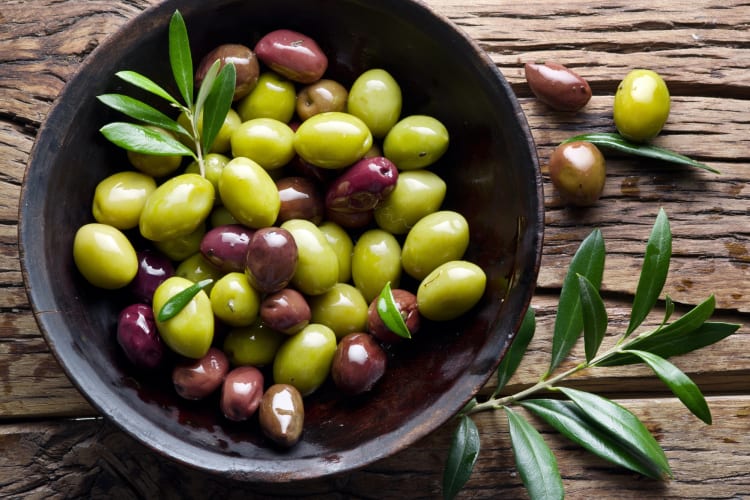
6. Good Source of Fiber
Olives have a modest amount of fiber per serving and can be a nice add-on in a diet that already includes bigger fiber sources like healthy vegetables, beans, lentils, whole grains, nuts and seeds. Fiber helps support regular digestion, can help you feel fuller between meals and is linked with better heart health.
Since most Americans fall short on recommended fiber intake, adding small, flavorful fiber sources can help. Just keep expectations realistic: olives are not a high-fiber food on their own.
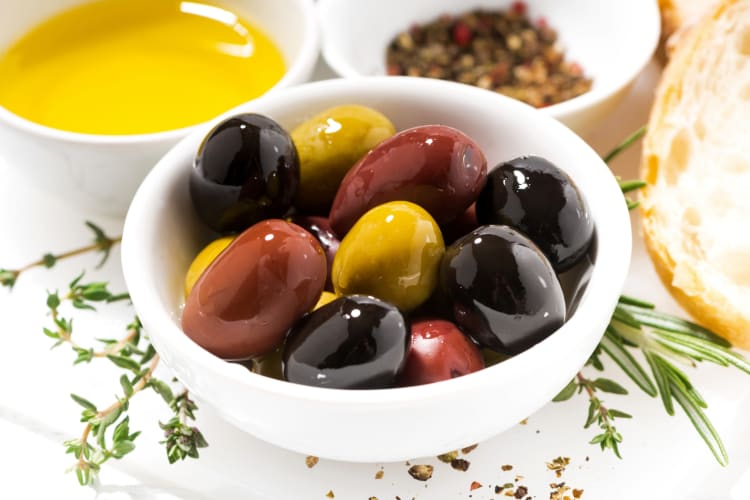
How To Incorporate Olives Into Your Diet
So, we've answered the question "Are olives healthy for you?" and know more about why they are healthy, but how can you incorporate them into your diet? Like all healthy foods, eating olives as they come as a snack can be a good way to add them to your diet.
You can also include them in dinner spreads, such as a tapas or mezze-style feast. They can be added to salads, pasta sauces or creative appetizers like antipasto skewers as well.
Olives make a tasty pizza topping too, whether that's on regular pizza or a lower-carb crustless pizza. Making tapenade or using chopped olives to top hummus are also delicious ideas.
While Mediterranean recipes work best with olives, you can really add them to any dish you like for an extra hit of savory flavor. As covered earlier, olive oil provides many of the same healthy fats and plant compounds found in whole olives while being much lower in sodium.
Therefore, you can also turn to any recipe that features olive oil to incorporate this nutrient-dense fruit into your diet. From classic spaghetti aglio e olio to a more unique orange olive oil cake, there's no shortage of options!
In all cases, remember to practice portion control as olives and olive oil are high in fat and calories, and whole olives are often high in sodium as well.
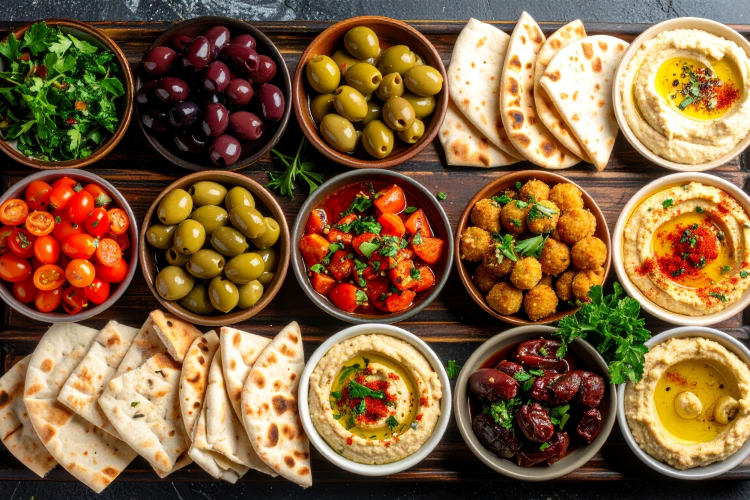
How Many Olives Should You Eat a Day?
While olives are healthy, they can add up quickly in calories and sodium, especially if you snack straight from the jar. A reasonable everyday portion for many people is a small serving, like 5 to 10 olives, depending on size and how salty they are.
If you’re adding olives to recipes, slicing or chopping them can help them go further without needing a heavy hand. When using olive oil, aim for about 1 to 2 tablespoons per day, depending on your calorie needs and what other fats you’re already getting from foods like nuts, seeds, avocado or fatty fish.
If sodium is a concern, look for reduced-sodium options, give olives a quick rinse and blot them dry. This can take the edge off the salt while still letting you enjoy the flavor.
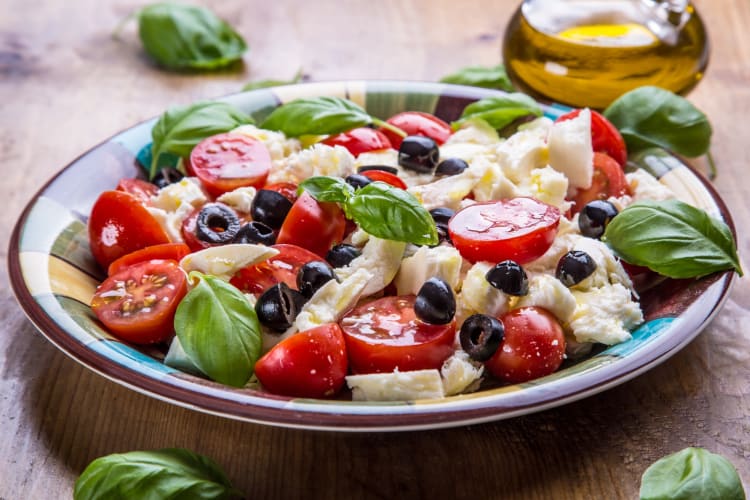
So, after all of this, are olives healthy? Yes, they are.
While the answer to “Which olives are the healthiest?” can lean toward black olives, the difference is usually modest and often comes down to how they’re cured and how much sodium they carry. Whether green or black, olives offer heart-friendly unsaturated fats, antioxidants and small amounts of fiber that can fit well in an overall balanced eating pattern.
From cooking with olive oil to adding olives to salads or enjoying a few whole olives as a snack, your health can benefit when portions and sodium stay in check. So why not make it a goal to find a few more ways to enjoy olives?
For even more ways to explore your favorite foods, check out other experiences happening on Cozymeal.
